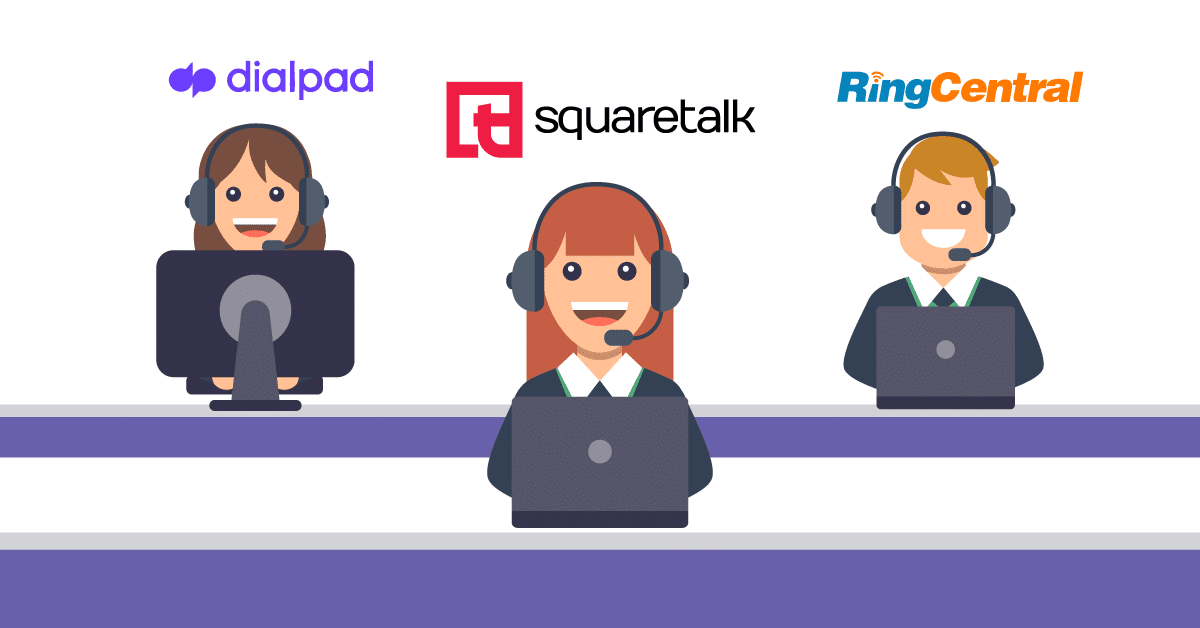Customer interactions are the heartbeat of any successful call center, and exceptional service doesn’t happen by chance—it’s the product of excellent coaching. As the engine driving agent performance, coaching in a call center is critical not only for personal development but also for delivering a service experience that leaves customers feeling valued and heard.
In this guest post, we’ll explore seven top tips that are vital for impactful call center coaching. Each tip we’re about to discuss has been strategically selected to help you elevate the support your agents provide, fostering a thriving environment where continuous improvement is part of the daily routine.
Establish Clear Coaching Objectives
To foster a culture of growth within your call center, establishing clear coaching objectives is a quintessential first step. Clear objectives provide direction, facilitate measurable outcomes, and ensure that your coaching efforts are in tandem with the overarching goals of your organization.
Here’s how to set specific, measurable goals and align coaching objectives with your business strategies:
Begin by identifying the key performance indicators (KPIs) that matter most to your business. These could range from average handle time and customer satisfaction scores to first call resolution rates. These KPIs will act as the yardsticks by which you’ll measure coaching effectiveness.
Set specific goals for each KPI that are both challenging yet attainable. For instance, rather than simply aiming to “improve customer satisfaction,” set a precise target like “increase customer satisfaction ratings by 10% over the next quarter.”
Make sure these goals are measurable. This means breaking them down into quantifiable benchmarks that can be clearly tracked and assessed over time. Use your call center’s analytics tools to monitor progress and identify areas where agents may need more focused coaching. Track customers interactions with a sales CRM, you can use one of these sales pipeline templates if you’re not inspired.
Align these objectives with broader business strategies. For instance, if your company is aiming to expand its market share, emphasize coaching around upselling or cross-selling techniques. This ensures that every coaching session contributes to the large-scale vision of the organization.

Communicate these objectives to your agents. They need to understand what is expected of them and how their individual performance ties into the success of the team and the company as a whole. Clarity will not only motivate your agents but also help them focus on the areas that matter most.
Regularly review and adjust objectives as needed. Business priorities can shift, and your coaching strategies should be flexible enough to accommodate these changes. Keep an eye on industry trends, and gather feedback from agents to ensure that your coaching objectives remain relevant and effective.
Utilize your call center’s analytics tools, including log monitoring systems, to track progress and gather data on agent performance and customer interactions in real-time. By leveraging insights from log monitoring, such as average handle time and customer satisfaction scores, you can identify areas for focused coaching and adjust objectives accordingly. This proactive approach ensures coaching efforts align with business strategies, contributing to overall performance improvements.
By setting clear, measurable, and aligned coaching objectives, you create a solid foundation for your call center’s growth. Your coaching efforts will be more strategic, focused, and most importantly, will have a noticeable impact on both agent performance and customer satisfaction.
Utilize a Structured Coaching Framework
Adopting a structured coaching framework in your call center can lead to a more organized, effective, and consistent approach to developing your agents. When coaching is erratic or subjective, it can confuse agents and lead to mixed results.
A structured framework, on the other hand, provides a roadmap for both coaches and agents to follow, ensuring that each session is purposeful and builds towards common goals. Here’s how a structured approach can enhance your coaching efforts and some examples of established coaching models to consider:
A structured framework ensures consistency across all coaching sessions, regardless of the coach or the agent being coached. This ensures that all agents are being developed with the same standards in mind, promoting fairness and equal opportunity for growth.
It allows for more objective feedback and assessments. With a defined set of criteria, coaches can more easily identify areas of improvement and commendable performance, reducing the potential for bias.
A framework sets up expectations, providing agents with a clear understanding of the coaching process and what they can anticipate in terms of their own development path.

Two of the most popular and effective coaching models are GROW and SMART:
The GROW Model
- Goal: Define clear, achievable and motivating goals for improvement or skill development.
- Reality: Assess the current reality and understand where the agent stands in relation to their goals.
- Options: Explore different strategies and options for reaching the set goals.
- Will (or Way Forward): Commit to specific actions in order to move towards achieving the goal.
The SMART Criteria
- Specific: Goals must be clear and specific so both coach and agent know exactly what is expected.
- Measurable: There should be clear criteria to measure progress towards each goal.
- Achievable: Goals should be realistic and attainable to be motivating rather than discouraging.
- Relevant: They must align with broader business strategies and objectives.
- Time-bound: Assigning deadlines to goals creates urgency and prompts action.
By selecting and implementing a coaching model like GROW or SMART, your call center can benefit from an organized approach that reduces confusion, enhances transparency, and facilitates the tracking of progress over time. Whatever model you choose, the key is to apply it consistently and adapt it as needed to fit the unique needs of your call center team.
Employ Data-Driven Insights
Coaching in a call center environment can be greatly enhanced by employing data-driven insights. Leveraging call metrics and analytics can objectively inform coaching sessions, identify areas of opportunity, and track performance improvement over time.
One powerful tool in data-driven coaching strategies is sentiment analysis. By applying sentiment analysis to customer interactions, call centers can gain valuable insights into the emotional tone and satisfaction levels of customers during their interactions with agents. This analysis goes beyond traditional metrics and provides a deeper understanding of customer sentiment, allowing coaches to tailor their feedback and training to address specific emotional cues and improve overall customer experience.
It involves moving away from a one-size-fits-all approach and tailoring coaching to the unique needs and performances of each agent. Here’s how you can leverage these insights and use customer feedback to steer your coaching:
Utilize your call center’s analytic tools to gather data on agent performance. Metrics such as call duration, hold times, transfer rates, and resolution times are valuable indicators of how efficiently and effectively agents are handling customer inquiries.
Analyze customer satisfaction metrics, including Net Promoter Scores (NPS), Customer Satisfaction Scores (CSAT), and post-call survey results to get a direct measure of the customer’s experience with your agents.

Act on speech analytics if available. This technology can help you identify not just what is being said but also how it’s being said, recognizing tone, tempo, and stress levels in both the agent’s and customer’s voices, which can be critical for coaching on soft skills and customer interaction.
Monitor trends and patterns in the data to identify both strengths to be leveraged and common pain points that need addressing. For example, if multiple agents are struggling with certain types of calls, this might indicate a need for group training on specific topics or systems.
- Share this data with your agents in a constructive way. Data alone can be overwhelming or demotivating if not presented properly. Use it to celebrate successes as well as gently highlight areas for improvement. Ensure the conversation remains focused on development and growth.
Use customer feedback as a coaching tool. Direct feedback from customers can highlight specific instances that can be used as learning opportunities. Feedback can be both positive—providing examples of what to do—and constructive—providing examples of what to avoid.
Record and review calls for training purposes. Listening to actual calls allows for targeted feedback and sometimes serves as a self-coaching tool where agents can critique their own performance with the guidance of their coach.
Employing a data-driven approach to call center coaching doesn’t mean reducing all coaching interactions to numbers and charts. Instead, it provides a factual baseline from which personalized and impactful coaching can be built.
Using solid data and customer feedback, coaches can deliver bespoke coaching that’s more likely to lead to tangible improvements in agent performance and customer satisfaction.
Focus on Developing Soft Skills
While technical knowledge and adherence to protocols are essential in call center operations, soft skills are the true differentiators of outstanding customer service. Emphasizing the development of empathy, patience, and communication skills in your coaching can lead to improved customer interactions and greater satisfaction.
The Importance of Empathy, Patience and Communication
Empathy allows agents to understand and share the feelings of customers, fostering a connection that can lead to increased satisfaction and loyalty. Agents who empathize with customers are better able to tailor solutions that meet customers’ emotional as well as practical needs.
Patience is key to maintaining a positive demeanor during interactions, even when dealing with challenging or frustrated customers. It underpins the ability to listen fully, understand the issue at hand, and work through problems without rushing to conclusion.
Effective Communication is not just about clarity in the information provided, but also the ability to listen actively, confirm understanding, and convey solutions in a manner that reassures and satisfies the customer.

Techniques for Building Rapport with Customers
Active Listening: Encourage agents to fully focus on the customer, acknowledge their concerns, and repeat back key points, so the customer feels heard and understood.
Personalization: Guide agents to use the customer’s name and information to personalize the conversation and create a more engaging experience.
Positivity: Train your agents to use positive language, even when delivering less favorable news, to keep the interaction constructive.
Mirroring and Tone Matching: Teaching agents to subtly mirror a customer’s tone and language can build rapport and make customers feel more at ease.
Open-Ended Questions: Instruct agents to use open-ended questions that encourage customers to provide more detail about their situation, facilitating better problem-solving.
Empathy Statements: Develop a set of empathy statements that agents can adapt and use in conversations to show customers that their feelings are acknowledged and valued.
Feedback and Role-Play: Use role-playing exercises in coaching sessions where agents can practice soft skills in simulated scenarios and receive feedback.
By placing a significant emphasis on developing these soft skills, you set the stage for enhanced customer encounters that lead to positive outcomes.
Agents who are well-versed in empathy, patience, and communication are not only poised to resolve issues more effectively but also contribute to a brand reputation that is grounded in excellent customer service.
The key to success with soft skills is ongoing practice and reinforcement, so consistently weave these into your coaching regimens for sustainable development.
Promote Continuous Learning
To stay competitive and maintain high service standards, call centers must promote a culture of continuous learning and improvement.
Rather than viewing training as a one-off occurrence at the start of an agent’s career, it should be seen as an ongoing journey. Continuous learning keeps agents engaged, informed, and prepared to meet the evolving demands of the customer service industry.
Here are actionable steps for creating this learning culture and how to incorporate regular training and upskilling sessions:
Creating a Culture of Ongoing Improvement and Education
Leadership Buy-In: Secure commitment from the top. When leaders prioritize learning, this mindset trickles down throughout the organization.
Career Pathing: Show agents a clear path of progression within the company, making it clear that learning and development lead to more opportunities.
Learning Resources: Provide a variety of learning materials, including an accessible digital library, webinars, and workshops that cater to different learning styles.
Encourage Self-Directed Learning: Give agents the autonomy to pursue knowledge in areas of their interest which align with company goals. This could include access to online courses, industry certifications, and cross-training opportunities.

Incorporating Regular Training and Upskilling Sessions
Scheduled Training Sessions: Embed regular skills training sessions into the workforce schedule, ensuring that agents are keeping abreast of the latest tools, technologies, and industry best practices.
Microlearning: Introduce concepts of microlearning, where training is broken down into short, focused segments that are easier to consume and retain, fitting into the busy workflow of the call center environment.
Peer Learning and Mentoring: Facilitate knowledge sharing with programs that pair less experienced agents with seasoned ones for mentorship and shared learning experiences.
Feedback Loops: Utilize coaching sessions and performance reviews to identify specific training needs. Allow agents to provide input on areas where they feel additional training could be beneficial.
Creative Learning Interventions: Gamify learning experiences and consider holding friendly competitions that encourage knowledge retention and application.
Application of Knowledge: Encourage agents to not just learn but also apply new knowledge in their work. Provide opportunities for them to experiment with new approaches in a safe environment, such as simulated call scenarios.
Promote Information Security Measures: Emphasize the importance of identity proofing alongside regular training, ensuring robust protection against unauthorized access and data breaches in mid to large scale offices.
By embracing continuous learning and making it an integral part of your call center’s ethos, you empower your agents to continually refine their skills and adapt to changes.
This not only bolsters your customer service offering but also contributes to employee satisfaction and retention. Remember, an investment in your agents’ growth is an investment in the quality of service your call center provides.
Offer Real-Time Feedback and Recognition
Real-time feedback and recognition are powerful tools in the development and motivation of call center agents.
Immediate, constructive feedback helps agents quickly adjust and improve their performance, while recognition of achievements reinforces positive behaviors and boosts morale. Here’s how you can effectively implement both in your coaching strategy:
The Impact of Immediate, Constructive Feedback
Immediate Application: When feedback is given in real-time, or shortly after a call, agents can immediately apply the advice to their next interaction, making the learning process more effective and concrete.
Specificity is Key: Ensure that feedback is specific and action-oriented. Instead of vague comments like “do better,” provide clear, detailed pointers like “next time, try acknowledging the customer’s issue before suggesting a solution.”
Positive Reinforcement: Strike a balance between what needs improvement and what the agent did well. This approach encourages agents and makes them more receptive to constructive criticism.
Encourage Self-Assessment: Empower agents by encouraging them to evaluate their own calls when possible. This helps develop critical thinking and self-improvement skills.

Recognizing Achievements to Boost Morale and Performance
Timely Recognition: Recognize and reward achievements as soon as possible. This could be after a particularly challenging call, a fruitful day, or immediately following a noticeable improvement in performance.
Public Praise: When appropriate, share successes in team meetings or on internal platforms. Public recognition not only boosts the individual’s morale but also sets a positive example for the team.
Personalized Recognition: Understand what form of recognition resonates with each agent. Some might appreciate a private ‘thank you,’ while others might value more tangible rewards or public accolades.
Incorporate Peer Recognition: Develop systems where peers can acknowledge each other’s strengths and successes, fostering a supportive team environment.
Link Rewards to Company Values: Align recognition with your company’s core values. For instance, an agent who goes above and beyond to resolve a difficult issue could be praised for embodying the company’s commitment to customer satisfaction.
Offering real-time feedback and recognition not only aids in the immediate improvement of customer service skills but also contributes to a positive work environment where agents feel their work is valued.
It’s a cycle that promotes ongoing growth: recognition fuels motivation, which in turn leads to better performance and even more opportunities for positive feedback and recognition.
Implementing these strategies effectively will likely enhance both agent satisfaction and customer experiences.
Empower Agents with Autonomy and Support
Empowering call center agents by granting them autonomy backed by strong support systems is instrumental in fostering an environment of accountability and excellence.
By encouraging agents to take ownership of their decision-making and problem-solving, you enable them to deliver more personalized and efficient customer service.
Here’s how to bolster agent empowerment and ensure they have the tools and resources they need:
Encouraging Decision-Making and Problem-Solving Capabilities
Trust Your Agents: Demonstrate trust in your agents’ abilities by allowing them to make certain decisions without always seeking approval. This could include handling refunds, adjustments, or following up on complex issues.
Set Clear Boundaries: While autonomy is important, clearly define the scope and limits of what agents can do on their own. This ensures consistency and maintains control over critical business decisions.
Foster a Supportive Atmosphere: Encourage an environment where agents are comfortable seeking help and advice. This promotes a team-based approach to problem-solving and decision-making.
Provide Decision-Making Frameworks: Offer guidelines and frameworks for making common decisions. This equips agents with a structure for independently handling various scenarios while remaining aligned with company policies.

Providing the Necessary Tools and Resources
Invest in Technology: Equip agents with the up-to-date tools and software they need to handle calls effectively. This includes CRM systems, knowledge bases, and communication tools.
Accessible Information: Ensure that agents have quick and easy access to the necessary information so they can deliver accurate and prompt solutions.
Training and Development: Offer continuous training that helps agents keep up with product updates, policies, and industry standards, so they feel confident in their roles.
Mentorship and Coaching: Continue to support agents with regular coaching sessions and provide mentorship programs that assist in their professional growth.
When call center agents are provided with both the autonomy to make decisions and the robust support needed to execute those decisions effectively, they are better equipped to handle customer inquiries with confidence and competence.
They become more engaged in their work, more committed to delivering high-quality service, and more likely to innovate in their approach to customer interactions. Ultimately, empowered agents contribute to a stronger, more dynamic call center and a better experience for every customer they engage with.
Conclusion
In conclusion, call center coaching is an ongoing journey that requires a multifaceted approach to effectively elevate the customer experience.
By establishing clear objectives, leveraging structured frameworks, utilizing data-driven insights, focusing on soft skills development, fostering a culture of continuous learning, and offering timely feedback and recognition, we empower agents to excel in their roles.
Beyond that, providing agents with autonomy and the necessary support ensures they have the confidence to make decisions that benefit the customer and the organization alike.

Vlad Orlov
Vlad is responsible for Brand Partnership at Respona, an all-in-one digital PR and link building software company.






